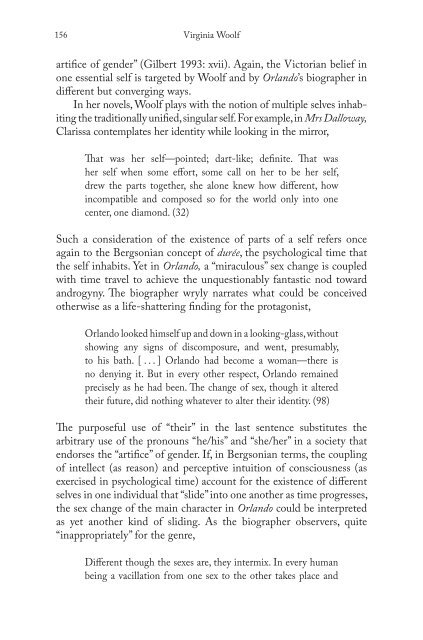Blooms Literary Themes - THE TRICKSTER.pdf - ymerleksi - home
Blooms Literary Themes - THE TRICKSTER.pdf - ymerleksi - home
Blooms Literary Themes - THE TRICKSTER.pdf - ymerleksi - home
You also want an ePaper? Increase the reach of your titles
YUMPU automatically turns print PDFs into web optimized ePapers that Google loves.
156<br />
Virginia Woolf<br />
artifi ce of gender” (Gilbert 1993: xvii). Again, the Victorian belief in<br />
one essential self is targeted by Woolf and by Orlando’s biographer in<br />
diff erent but converging ways.<br />
In her novels, Woolf plays with the notion of multiple selves inhabiting<br />
the traditionally unifi ed, singular self. For example, in Mrs Dalloway,<br />
Clarissa contemplates her identity while looking in the mirror,<br />
Th at was her self—pointed; dart-like; defi nite. Th at was<br />
her self when some eff ort, some call on her to be her self,<br />
drew the parts together, she alone knew how diff erent, how<br />
incompatible and composed so for the world only into one<br />
center, one diamond. (32)<br />
Such a consideration of the existence of parts of a self refers once<br />
again to the Bergsonian concept of durée, the psychological time that<br />
the self inhabits. Yet in Orlando, a “miraculous” sex change is coupled<br />
with time travel to achieve the unquestionably fantastic nod toward<br />
androgyny. Th e biographer wryly narrates what could be conceived<br />
otherwise as a life-shattering fi nding for the protagonist,<br />
Orlando looked himself up and down in a looking-glass, without<br />
showing any signs of discomposure, and went, presumably,<br />
to his bath. [ . . . ] Orlando had become a woman—there is<br />
no denying it. But in every other respect, Orlando remained<br />
precisely as he had been. Th e change of sex, though it altered<br />
their future, did nothing whatever to alter their identity. (98)<br />
Th e purposeful use of “their” in the last sentence substitutes the<br />
arbitrary use of the pronouns “he/his” and “she/her” in a society that<br />
endorses the “artifi ce” of gender. If, in Bergsonian terms, the coupling<br />
of intellect (as reason) and perceptive intuition of consciousness (as<br />
exercised in psychological time) account for the existence of diff erent<br />
selves in one individual that “slide” into one another as time progresses,<br />
the sex change of the main character in Orlando could be interpreted<br />
as yet another kind of sliding. As the biographer observers, quite<br />
“inappropriately” for the genre,<br />
Diff erent though the sexes are, they intermix. In every human<br />
being a vacillation from one sex to the other takes place and

















